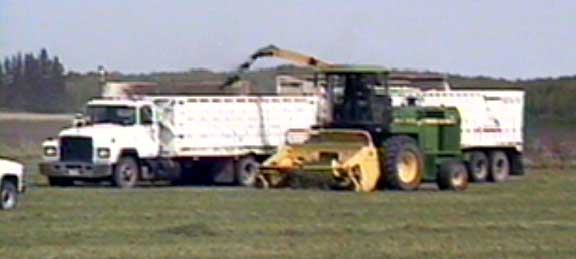 |
| FTLComm - Tisdale - June 6, 2000 |
 The first
week of June each year is when the pellet
making business begins each year. The cool weather
has delayed things a bit this year but not a whole lot and the first field has been
cut and is now being loaded and hauled to the plant for processing. From these pictures
taken this morning you can see the plant has not begun its dehydration processing
but the product is being piled up ready for heating probably within the next couple
of days. The first
week of June each year is when the pellet
making business begins each year. The cool weather
has delayed things a bit this year but not a whole lot and the first field has been
cut and is now being loaded and hauled to the plant for processing. From these pictures
taken this morning you can see the plant has not begun its dehydration processing
but the product is being piled up ready for heating probably within the next couple
of days.These are difficult times in the alfalfa dehydration industry. Huge crops the last two years have meant that the producers are awash in alfalfa while at the same time the affects of the Asian financial melt down of two years ago is still having its affects on the world markets as Japan and China have |
 limited their
importation of limited their
importation ofsome commodities to ease the pressure on their balance of trade and thereby reduce their problems with the inflated price of the American dollar. With the Asian markets depressed there has been the development of indigenous alfalfa production and palletising in Japan. The Japanese have developed a really large plant to process their own production and this is cutting into North American sales. In our own area Parkland Alfalfa has ceased production this year and all other plants are feeling the strain of depressed |
| international markets. Tisdale ran its plant most of the winter processing baled
alfalfa into cubes which are primarily sold in the North American market and still
has a fair number of stacks in its yard, though much less than the carry over this
time last year. Arborfield and Parkland both were able to process their baled alfalfa
and get it off to market. This year's product should be good despite the rather cool temperatures, the moisture has been right on time and we might even see some rain this afternoon. All the signs point toward some nice warm weather now for the next couple of weeks so production this year should be par with earlier years. One important aspect of the alfalfa industry has been a dramatic increase in the numbers of farmers moving from producing alfalfa for processing to those producing alfalfa seed which seems to be in reasonable demand. |
 |